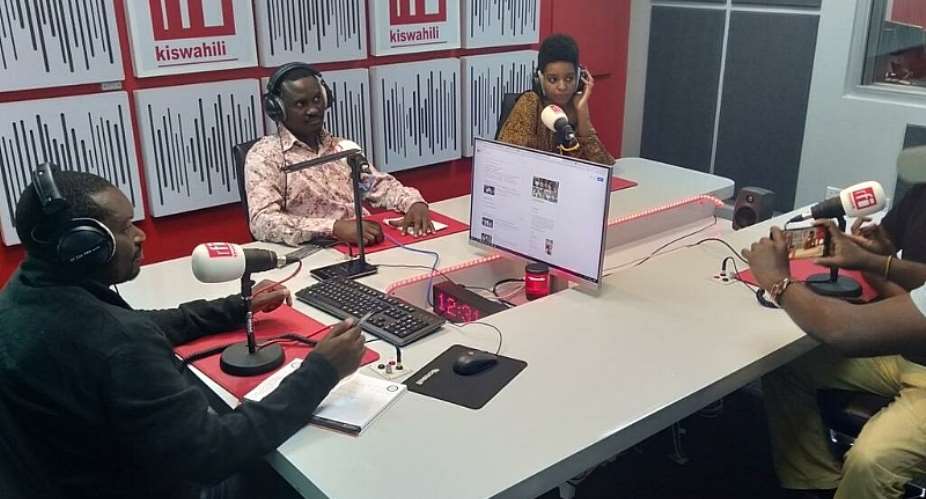A group of cartoonists from around the world assembled for the Cartooning for Peace initiative in Nairobi, Kenya, this month to raise awareness of the power of press cartoons in promoting democracy on the African continent.
"We are in Kenya because we have a program with cartoons for peace we want to present, how we can bring peace with cartoons,” said French cartoonist Erick Traunt, speaking at a roundtable at the RFI Kiswahili offices in Nairobi.
“Cartoons are a very powerful tool; and humor is a good weapon.”
Cartooning is an art that has been playing a major role in illustrating stories in different ways, from health to politics, and even sports. A simple drawing showing the features of its subject in a humorously exaggerated way, it can sometimes make more of a statement than an article.
Kenya is holding its general and presidential elections on 9 August, a time when cartoonists can spread peace through their drawing and create awareness, according to Alphonce Oketch, a cartoonist from the Star newspaper Kenya.
"It is the season for politics and that calls for a lot of political cartoons and as expected we will be required to shape and spur opinions and peace conversations through what we draw," said Oketch.
He adds that there are a number of issues surrounding this election and many do not have a grasp of what the politics is all about.
"It is actually upon us to give that direction, to point out issues and question some of these truths and half-truths that are being peddled around,” he said, adding that cartoonists can even question the validity of the promises that the candidates are making.
“At the end of the day, we have a responsibility towards the public not just to entertain, but educate and also preach peace,'' added Oketch.
According to As Lars Refn, a cartoonist from Denmark, cartoons are one of the many powerful tools of communication. They entertain, educate and act as a tool to pass political messages and make statements in indirect ways. Newspaper cartoons are a significant source of information for many readers worldwide.
He adds that cartooning in Africa, especially Kenya, has grown compared to other Africa countries and even Europe.
''Cartooning is a way of doing journalism and I was very positively surprised by the levels of cartooning in Kenya. You are stronger than British or American traditions,” he said.
“Now newspapers are moving from paper to digital and I still think that cartooning has a lot to say to people and can open up the humor and making you question things, thus giving information," added Refn.
Not all African countries have a cartoon culture
The cartoonists participating in the round table say that there are countries lagging behind in publishing information through cartoon art, primarily due to certain cultures that are not exposed to this style of information.
The media in Sudan face challenges, making it difficult for journalists and cartoonists to spread peaceful images through cartoons and other arts, said Alaa Satir, a cartoonist from Sudan.
''I think as a country we have a long way to go. In terms of media in Sudan we always cover what's happening in Khartoum. We don't know what's happening around and that reflects on Khartoum as well,” he said.
However, press freedom in some countries has been jeopardised with cartoonists and other journalists arrested, charged in court and imprisoned because of their work.
According to Ugandan cartoonist Jimmy Spire Ssentongo, more African leaders are beginning to change their attitudes and embrace cartoon art.
''There is so much freedom in Uganda and, maybe this might not be believed by many, but if you look at the kinds of cartoons I draw I think they can't be done in Rwanda, they can't be done in Zimbabwe,” he said.
After talking to his fellow cartoonists in Kenya, Spire believes Ugandan cartoonists have more freedom.
He adds that there are quite a number of cartoonists who have been arrested because of their work. Their media houses have been closed down.
The aim remains to preach peace and circulate important information to the community, and to urge more youths to join the industry and improve the art and their lives.
''I would like to encourage young people to take up art and to be interested in drawing, I know the big thing right now is the memes that go around in social media and they are really engaging with the youth," said the Kenyan cartoonist Celestine Wanjiru.





 Avoid pre-registered SIMs, buyer and seller liable for prosecution – Ursula Owus...
Avoid pre-registered SIMs, buyer and seller liable for prosecution – Ursula Owus...
 Election 2024: Mahama has nothing new to offer Ghanaians, Bawumia is the future ...
Election 2024: Mahama has nothing new to offer Ghanaians, Bawumia is the future ...
 OSP files fresh charges against ex- PPA Boss
OSP files fresh charges against ex- PPA Boss
 Withdraw unreasonable GH¢5.8m fine against former board members – ECG tells PURC
Withdraw unreasonable GH¢5.8m fine against former board members – ECG tells PURC
 Akroma mine attack: Over 20 armed robbers injure workers, steal gold at Esaase
Akroma mine attack: Over 20 armed robbers injure workers, steal gold at Esaase
 Those who understand me have embraced hope for the future — Cheddar
Those who understand me have embraced hope for the future — Cheddar
 Ghana will make maiden voyage into space should Bawumia become President — Chair...
Ghana will make maiden voyage into space should Bawumia become President — Chair...
 Train crash: Despite the sabotage, we shall not be deterred and will persevere —...
Train crash: Despite the sabotage, we shall not be deterred and will persevere —...
 Tema-Mpakadan railway project a perversion of the original viable concept design...
Tema-Mpakadan railway project a perversion of the original viable concept design...
 Train crash: Elsewhere, everyone involved in the test will either be fired or re...
Train crash: Elsewhere, everyone involved in the test will either be fired or re...
